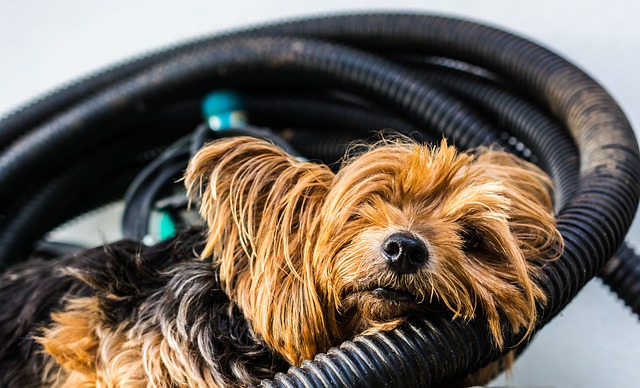The Yorkshire Terrier is undoubtedly a big dog in a small body. Many dog owners get attracted to the long, silky coat of fur, cute eyes, and the tiny size of the Yorkie. After bringing her home, they quickly discover that things aren’t what they were supposed to be. All of a sudden, you are dealing with constant bad behavior. No matter what you do, your Fido just won’t stop tearing your sofa. Despite your best efforts at housebreaking, the canine still loves to poop at the corner of your house.
This can be quite annoying and frustrating. However, before you take the dog back to the shelter, you might want to know why yorkies can be so annoying sometimes (plus what you can do about it).
The Good of Owning a Yorkie

If you’ve been on the receiving end of an annoying Yorkie, you have probably forgotten why you got him in the first place. Most dogs from this breed have been known to be intelligent. They are very inquisitive and mentally quick. They are also very brave. If you’ve ever seen a Yorkie charge at a German shepherd dog, you know this statement is true. He will move with tenacity while issuing threats with his high-pitched voice. It’s as if he forgets that he is like a grasshopper in the eyes of the GSD.
Speaking of his size, the Yorkie is a perfect lap dog. With only 3-7 lbs., you bet he occupies limited space. He is also easy to transport and accommodate. Another great thing about the Yorkie is that he sheds very little despite having long fur. Plus, he doesn’t need too much exercise. If a stranger comes by, he will scream at the top of his voice to alert you of impending danger.
Why Is He Annoying?
There are different reasons a Yorkshire terrier can drive you up the wall. We will go over some of them below.
1. Barking
One of the shortcomings of owning a Yorkie is his incessant barking. For some reason, barking at everything comes instinctively to this breed. He will bark when he’s agitated, excited, or when communicating with you. It is easy for him to get carried away and bark for long hours on end. If you live in an apartment with neighbors around you, your dog can get you in trouble with them. Even without neighbors, the barking can make you go crazy. Sadly, this is one of those things that come naturally to Yorkies.
What to do: Analyze the type of barking made by your dog and deal with that. It can be high-pitched barking, growling, yelping, or whining. Each one means something different. To be honest, it’s impractical to want to get the Yorkie to completely stop barking. He is a dog. Barking is his main way of communication. Instead, focus on minimizing the barking.
Try calming the ambiance of your home if it has frequent noises, inconsistent walking routines, unpredictable living patterns, and other disturbances. Also, give the Yorkie more exercise and see if it will stop the habit. The most effective tool, however, is proper training and socialization. Have an expert teach him to obey no-barking commands.
Related Post: 15 Small Dog Breeds That Don’t Shed or Bark
2. Disobedience
Most Yorkie owners also complain that their fur babies can also be headstrong and disobedient. When you tell them to stop barking at your visitors, they will completely ignore you. Simple instructions like ‘sit’, ‘go potty’, ‘stop’, and ‘come’ mean nothing to them. And sometimes you know that your dog understands your commands but chooses to disobey you. In most cases, this is because the dog doesn’t see you as a suitable alpha. He doesn’t see you as a good leader and is not motivated to listen to you.
What to Do: Train over and over until he changes. Get a good trainer who is firm and dominant to work with you here.
Related Post: 10 Worst Behaved Dog Breeds
3. Housebreaking Challenges

Another annoying habit that is common among Yorkies is housebreaking. Many dogs of the breed end up in shelters simply because the owners couldn’t figure out how to get them to pee and poop in the right place.
A Yorkie has a very tiny bladder that tends up to fill fast. This means accidents can happen frequently than when dealing with a big canine. Often, your pooch will not let you know he needs to eliminate. He expects you to pick up the cue from him and do the necessary. The fact that he can’t hold for long means accidents is the order of the day. The worst part is that if you don’t correct the behavior early enough, your pup will think you are okay with it and will keep going!
What to Do: The best thing is to potty train your Yorkie as soon as he comes home. However, if you didn’t have a chance to do that early enough, it’s never too late. Ensure you have potty training pads where he will go and training spray to attract him to the pad. You can also use your pup’s urine if you cannot get the spray. The pad should be accessible. Apply some spray on the pad and wait for the dog to pee there.
When he poops or pees in the wrong place, pick it up and place the waste in the right place. Keep doing that until your baby realizes what’s going on. Also, plan a schedule for your boy and stick to it. No matter what, don’t ever punish him for anything. It will only scare the dog which will work against you. When he poops or pees at the right pace, reward him for a good job done. If all fails, seek the services of an expert before you give up on your dog.
Related Posts:
12 Easiest Small Dogs to Potty Train
7 Best Potty Training Sprays for Dogs
How To Potty Train a Puppy on Pads
4. Aggression
The Yorkshire terrier was bred to eradicate rats. Because of this, he can be very fearless and aggressive towards strangers and other pets. He can easily get injured when he displays his aggressive behavior towards larger dogs.
What to Do: Expose the dog to dogs and people as much as you can. Don’t immediately force him to interact with them. Let socialization take its course. Just have a calm company of dogs to hang out with. Teach him good manners and social cues when he’s out in the public. Reward good behavior as much as possible. As usual, don’t scold him or pick him up in anger as it will confuse and scare him.
Related Posts:
Final Thoughts
Is your Yorkie so annoying? It could be one of the reasons above. No matter the problem, we believe there’s a solution. Give the tips a try and see if things will get better.
As an Amazon Associate, we may receive a small commission from qualifying purchases but at no extra cost to you. Learn more. Amazon and the Amazon logo are trademarks of Amazon.com, Inc, or its affiliates.

